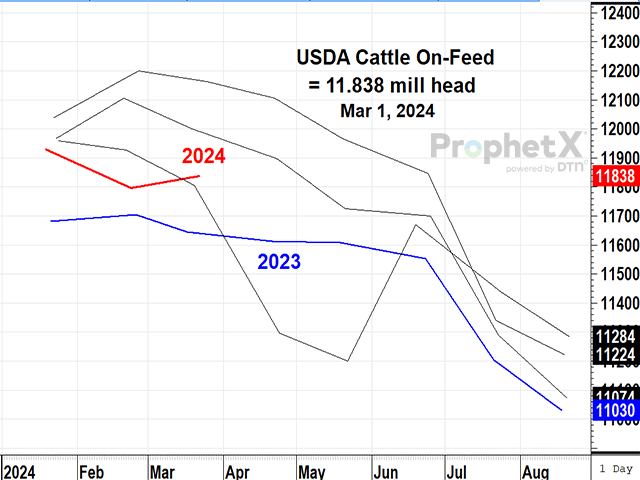USDA March 1 Cattle on Feed Report
March 1 Cattle on Feed Up 1% From Year Ago; February Placements Up 10%
This article was originally published at 2:04 p.m. CDT on Friday, March 22. It was last updated with additional information at 2:38 p.m. CDT on Friday, March 22.
**
OMAHA (DTN) -- Cattle and calves on feed for the slaughter market in the United States for feedlots with capacity of 1,000 or more head totaled 11.8 million head on March 1, 2024. The inventory was 1% above March 1, 2023, USDA NASS reported on Friday.
P[L1] D[0x0] M[300x250] OOP[F] ADUNIT[] T[]
Placements in feedlots during February totaled 1.89 million head, 10% above 2023. Placements were the highest for February since the series began in 1996. Net placements were 1.83 million head. During February, placements of cattle and calves weighing less than 600 pounds were 360,000 head, 600-699 pounds were 330,000 head, 700-799 pounds were 515,000 head, 800-899 pounds were 485,000 head, 900-999 pounds were 150,000 head, and 1,000 pounds and greater were 50,000 head.
Marketings of fed cattle during February totaled 1.79 million head, 3% above 2023.
Other disappearance totaled 56,000 head during February, 3% below 2023.
DTN ANALYSIS
"Friday's USDA Cattle on Feed report did exactly what it was expected to do -- it showed greater placements," said DTN Livestock Analyst ShayLe Stewart. "Analysts' pre-report placement estimates averaged 106.4%, which is different from what the report's actual data showed. It's likely that traders will react negatively to Friday's report because of that sole difference.
"I don't personally believe that the report should be viewed as bearish because, if you only compare Friday's data to that of a year ago, you're selecting a single trait to give merit to in the market as opposed to looking at the market through a wider 10,000-foot view. Based on the weather challenges that happened in January 2024, and the greater feeder cattle imports that we've seen thus far in 2024, seeing higher placements in February was inevitable, and the market shouldn't be taken back by that finding. But, unfortunately, traders won't likely take into account all of the market's weighing factors and just choose to trade the live cattle and feeder cattle contracts lower early next week.
"We can still learn some things from Friday's report, however. For starters, I think it's important to understand the weights of the cattle placed in February, as that will be telling as to when those cattle will be showing up on showlists later this year. Compared to a month ago, there were fewer cattle placed in February that weighed less than 700 pounds. But compared to both a month ago and a year ago, February placements of feeders weighing between 700 and 1,000 pounds was greater. I also found it interesting to note that compared to a month ago, the only states that didn't see greater month-over-month placements were Arizona and Idaho. All the other states represented in the report did see greater placements compared to January 2024."
See more details on how the cattle markets reacted this week to expectations of Friday's Cattle on Feed report and to other factors such as the fire on March 20 at the National Beef processing plant in Liberal, Kansas, at https://www.dtnpf.com/….
**
DTN subscribers can view the full Cattle on Feed reports in the Livestock Archives folder under the Markets menu. The report is also available at https://www.nass.usda.gov/….
| USDA Actual | Average Estimate | Range | |
| On Feed March 1 | 101% | 100.9% | 100.1-104.7% |
| Placed in February | 110% | 106.4% | 102.7-108.8% |
| Marketed in February | 103% | 104.1% | 103.3-104.7% |
(c) Copyright 2024 DTN, LLC. All rights reserved.




